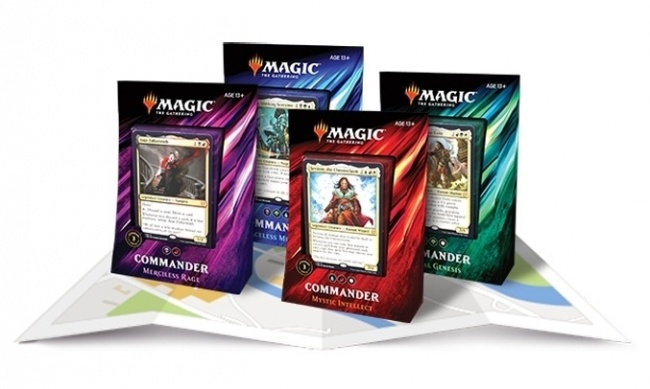Rolling for Initiative is a weekly column by Scott Thorne, PhD, owner of Castle Perilous Games & Books in Carbondale, Illinois and instructor in marketing at Southeast Missouri State University. This week, Thorne updates the U.S.-China tariff situation as it relates to toys and games, and talks about the new UPC system for Magic: The Gathering Commander 2019 decks.
In case you missed it, the administration has announced another tariff on products imported from China starting yesterday, bumping the tax collected on goods imported from China by about 15% (see "Rolling for Initiative--Talking Tariffs"). The toy, game, electronics, and most consumer goods industries managed to get themselves exempted from the promised increase until the next round of tariffs gets imposed in mid-December, meaning that those products exempted from this week’s tariffs will get through the holiday sales season without having to worry about getting hit with a price increase during the busiest selling season of the year. The shoe industry, for example, which lobbied heavily against the tariffs going into effect this week, expects to see prices on a pair of shoes selling for around $100 to increase by $15 to $20 as a result of a tariff. Shoe manufacturers, and others affected by the tariffs, will have to decide whether to pass along the price increase to consumers or to absorb it and reduce their overall margin. This is a situation that game publishers, unless there's a truce or some sort of negotiated settlement in the trade war between the US and China, will have to face (see "Rolling for Initiative--Talking Tariffs 3: Tariffs from the Publisher's Viewpoint").
During the past year’s series of tariff increases, the administration has avoided putting a tariff on anything that would sell to consumers directly. Instead, they've opted to apply the tariffs to raw materials and processed goods with the expectation that China, not wanting to cut itself off from its major source of supply of soybeans, wheat, lobster and other foodstuffs, would prove amendable to more openness to its market, and then, increase the level of enforcement of patent and trademark laws. Unfortunately, what has happened is that China has turned to other, non-tariff enacting suppliers such as Canada, Argentina, and Russia for supplies. This is leading many American producers to fear that, once trade disputes resolve between the two countries, China will continue to purchase from the new suppliers with which it has developed relations rather than returning to American markets.
Shifting to new supply chains, as the President has called for, is not something that companies can do quickly either. Xcel Brands (which, among other things, licenses and produces the Isaac Mizrahi clothing line) decided to move a significant amount of production out of China in order to secure its supply chain against disruptions such as that going on currently between China and the U.S., and said it took the company about 2 years to fully get the new supply chains into place, according to NPR. Making such a significant move is not something a company undertakes without a great deal of investigation and preparation.
On a somewhat related topic, Wizards of the Coast has assigned individual UPC codes to each of the Magic: The Gathering Commander 2019 decks (see "WotC Unveils 'M:TG Commander 2019' Decks"), something for which retailers have long asked. Although sold and previously coded as a set, customers sought each deck in varying levels of demand. Past sets have used the same UPC on each deck. When stores broke up the sets and re-priced each individual deck according to demand, as they often did, they had to either make sure to mark each deck with the new price and ring that in at the register, or create individual bar codes for each deck. This was a time consuming process for many stores, and having individual codes for each deck makes pricing them much easier. Hopefully, other companies selling products in sets that get broken apart for retail will take note and adopt this procedure for their releases because individual bar codes per product make them so much easier to track.
The opinions expressed in this column are solely those of the writer, and do not necessarily reflect the views of the editorial staff of ICv2.com.

Column by Scott Thorne
Posted by Scott Thorne on September 2, 2019 @ 1:23 am CT



